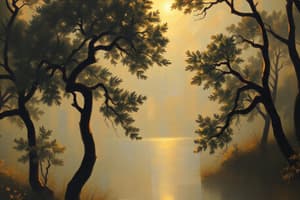Podcast
Questions and Answers
What time period does contemporary literature typically refer to?
What time period does contemporary literature typically refer to?
- During the Industrial Revolution
- During the Renaissance era
- During and after World War II (correct)
- Before World War II
Which of the following best describes the focus of contemporary literature?
Which of the following best describes the focus of contemporary literature?
- Social and political issues (correct)
- Science fiction only
- Medieval romance
- Classical mythology
What differentiates emergent literature from contemporary literature?
What differentiates emergent literature from contemporary literature?
- Emergent literature focuses solely on political issues
- Emergent literature reflects new ideas and societal trends (correct)
- Emergent literature cannot comment on current events
- Emergent literature is always set in the past
Popular literature primarily aims to:
Popular literature primarily aims to:
In contemporary literature, authors use their works mainly for:
In contemporary literature, authors use their works mainly for:
What is a key characteristic of popular literature?
What is a key characteristic of popular literature?
Which genre is emergent literature associated with?
Which genre is emergent literature associated with?
What distinguishes popular literature from contemporary literature?
What distinguishes popular literature from contemporary literature?
Which literary genre is known for addressing the psychological impact of slavery and trauma?
Which literary genre is known for addressing the psychological impact of slavery and trauma?
What sets emergent literature apart from popular literature?
What sets emergent literature apart from popular literature?
Study Notes
Introduction
Literature is a vast and diverse field that encompasses a multitude of genres, styles, and themes. In contemporary literature, authors often explore social and political issues, while popular literature aims to entertain large audiences. Emergent literature, on the other hand, is a relatively new or developing genre that often reflects new ideas and societal trends. In this article, we will delve into the subtopics of contemporary literature, popular literature, and emergent literature, shedding light on their unique characteristics and the authors who have shaped these literary movements.
Contemporary Literature
Contemporary literature refers to literature written after World War II and up to the present. This genre encompasses a wide range of themes and styles, often reflecting the social and political issues of the time. Contemporary literature is characterized by its ability to comment on the social and political context of a given period, with authors using their works to provide commentary on current events and trends.
One of the most notable aspects of contemporary literature is its flexibility. While it is often associated with works written during and after World War II, it can also include works set in periods before or after this time, as long as they are used as a device for contemporary commentary. This flexibility allows contemporary literature to address a wide range of topics, from the psychological impact of slavery and the trauma it caused to the nature of religion and faith and the notion of forcing a belief system onto others.
Popular Literature
Popular literature, also known as mass market literature or commercial literature, is a genre of fiction intended to appeal to a broad audience. It is characterized by its accessibility, with works often written in a straightforward, engaging style that is easy for readers to understand and relate to. Popular literature can encompass various genres, including romance, science fiction, fantasy, and mystery.
Popular literature is often contrasted with contemporary literature, which is more focused on commenting on social and political issues. However, both genres share a focus on the written word and the ability to captivate readers. Popular literature is not limited to contemporary themes, and it often explores timeless topics that resonate with readers across generations.
Emergent Literature
Emergent literature is a relatively new or developing genre that often reflects new ideas and societal trends. This genre is characterized by its innovative approach to storytelling and its willingness to challenge traditional literary conventions. Emergent literature can encompass a wide range of genres, including science fiction, fantasy, and experimental literature.
One of the key features of emergent literature is its ability to challenge readers' perceptions and push the boundaries of what is considered literature. It often explores new themes and ideas, reflecting the changing world around us. Examples of emergent literature include works that explore the use of technology in storytelling, such as interactive fiction or virtual reality stories.
Conclusion
In conclusion, contemporary literature, popular literature, and emergent literature each offer unique insights into the world of literature. Contemporary literature provides commentary on social and political issues, popular literature entertains broad audiences, and emergent literature challenges traditional literary conventions. These genres showcase the richness and diversity of literature, reflecting the ever-evolving world around us.
Studying That Suits You
Use AI to generate personalized quizzes and flashcards to suit your learning preferences.
Description
Delve into the characteristics of contemporary literature, popular literature, and emergent literature in this insightful article. Explore how each genre reflects unique themes, styles, and societal trends, shaping the world of literature. Learn about the authors who have made significant contributions to these literary movements.




